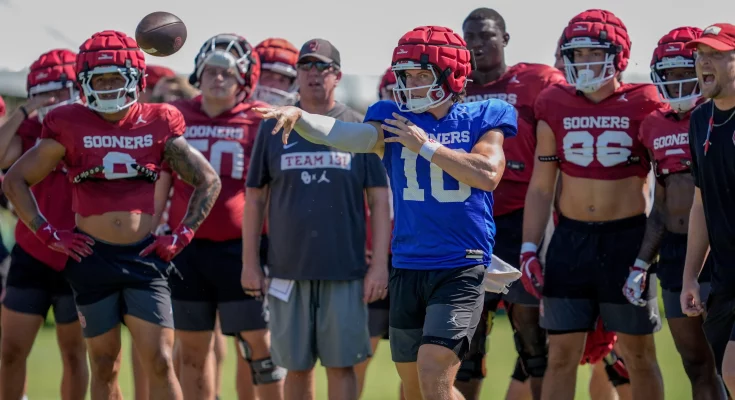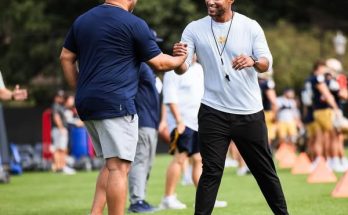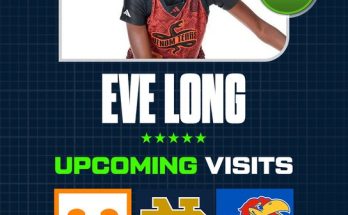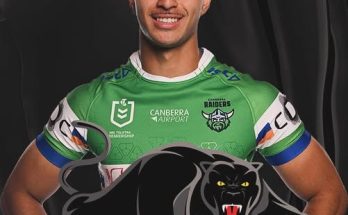The 2025 college football season is fast approaching, and optimism is swirling around the Oklahoma Sooners as they prepare for what could be a pivotal year in the program’s continued evolution under head coach Brent Venables. One of the key voices fueling this sense of confidence is quarterback John Mateer, who has emerged as a vocal leader and steady presence in the Sooners’ quarterback room. After months of spring workouts, film sessions, and off-season conditioning, Mateer recently shared his thoughts on the offense’s progress, stating, “We’re in a really good spot.” That simple yet powerful affirmation has sparked curiosity and excitement among fans and analysts alike, as many are eager to see if the Sooners’ offense can take the next step toward national relevance and consistency.
Mateer’s comments come at a time when Oklahoma is looking to solidify its identity in the SEC, a conference notorious for tough defenses and deep quarterback talent. The Sooners know that to compete at the top of the league, their offense must be not only dynamic but also reliable. Mateer’s sense of composure and clarity when discussing the team’s growth suggests that the players are beginning to grasp the complexity of their offensive system and are executing at a high level in practice. That’s no small feat in a conference that routinely punishes mistakes and preys on inexperienced signal-callers. But Mateer, a player who has paid his dues with patience and preparation, seems ready to rise to the challenge.
At the heart of Mateer’s confidence is the progress he and his teammates have made in mastering offensive coordinator Seth Littrell’s system. Since Littrell took over play-calling duties, the Sooners have focused on implementing a balanced, aggressive scheme that emphasizes tempo, adaptability, and exploiting mismatches. While some growing pains were evident during last season’s transition, there were also glimpses of the high-powered potential that has defined Oklahoma offenses of years past. Now, with another offseason under their belts, players have begun to internalize the system’s nuances. According to Mateer, it’s not just about memorizing plays anymore—it’s about instinctively knowing where to go with the ball, reading defenses more efficiently, and playing with rhythm.
Part of what makes Mateer’s development particularly noteworthy is the competition he has faced within the quarterback room. The Sooners boast a deep roster of signal-callers, including highly-touted recruits and transfer portal additions who bring different skill sets to the table. Rather than retreat in the face of competition, Mateer has embraced it, using it as fuel to sharpen his game. His leadership has grown more vocal, and his presence in the huddle commands respect. Coaches have taken notice of his poise, noting that he rarely gets rattled and often serves as a calming influence for younger players during intense scrimmages and practice sessions.
But Mateer is not just focusing on his individual performance. His comments reveal a broader awareness of how the offense functions as a unit and the importance of chemistry among all eleven players on the field. He has praised the offensive line for its improved communication and physicality, attributes that will be crucial as the Sooners face increasingly aggressive SEC pass rushers. He’s also commended the receiving corps for its route discipline and ability to adjust on the fly. According to Mateer, “Everyone’s on the same page now. We’re talking through plays, recognizing coverages faster, and making fewer mental mistakes.” That kind of synchronicity is essential for an offense that relies on timing and execution more than sheer athleticism.
The running game has also benefitted from this offensive maturation. Oklahoma has always prided itself on having versatile backs who can run between the tackles and catch passes out of the backfield. With the offensive line gelling and the quarterbacks making better reads, the run game is poised to become a real weapon again. Mateer acknowledged that having a dependable ground attack helps alleviate pressure on the quarterback, opening up play-action opportunities and keeping defenses honest. He highlighted how much smoother the offense feels when it’s operating with balance, allowing the Sooners to dictate tempo and control the flow of the game.
Another key area of growth has been situational football—an often-overlooked aspect that separates good teams from great ones. Mateer noted that the team has placed a strong emphasis on red zone efficiency, third-down conversions, and two-minute drills. These are the moments where discipline and preparation reveal themselves, and the Sooners have been drilling them repeatedly during camp. “We’re getting better at finishing drives,” Mateer said. “That’s something we struggled with at times last year, but now there’s more urgency and attention to detail.” Those improvements could prove crucial in the high-stakes SEC matchups that often come down to a handful of plays.
Mateer’s optimism also reflects a cultural shift within the program. Under Venables, the Sooners have embraced a mentality rooted in accountability, competition, and relentless effort. The culture isn’t just about rah-rah speeches or empty slogans—it’s about daily habits, how players carry themselves in the weight room, on the practice field, and in the film room. Mateer has bought into that vision completely and has emerged as one of its most vocal ambassadors. He understands that being a leader means setting the tone even when the cameras aren’t rolling, and he takes pride in being someone teammates can count on.
Despite the internal progress, Mateer and the Sooners are well aware that they’ll need to prove themselves on Saturdays. The SEC schedule is unforgiving, and Oklahoma’s inaugural year in the conference will feature a gauntlet of elite defenses and hostile road environments. There’s no room for complacency or shortcuts. Every detail matters, and every rep in practice has to be treated like a game situation. Mateer’s measured demeanor suggests he understands this better than most. He’s not declaring victory before the season starts—he’s simply expressing belief in the work that’s been done and the foundation that’s been laid.
The fans have taken notice of this sense of calm confidence. After a few seasons of uncertainty and inconsistency, there’s a renewed sense of purpose within the Oklahoma fan base. Mateer represents that turning point—a player who’s not a flashy star or media darling but someone who leads through action and brings out the best in those around him. Whether or not he ultimately wins the starting job, his influence on the offense is undeniable. He’s helped raise the floor of the quarterback room and provided a steady presence that can keep the offense grounded when things get chaotic.
There’s also something to be said about Mateer’s journey. In an era where players frequently transfer at the first sign of adversity, Mateer has chosen to stay and develop within the program. That kind of loyalty and perseverance resonates with fans and coaches alike. It suggests a long-term mindset that values growth over instant gratification. It also sends a message to younger players that progress isn’t always linear and that sometimes the most valuable lessons come from staying the course even when the path is difficult.
Looking ahead, Mateer’s role may evolve as the season unfolds. Whether he’s the starter, a reliable backup, or a situational contributor, his leadership will continue to shape the team’s trajectory. In many ways, he embodies the kind of player Oklahoma wants to build around—smart, tough, selfless, and deeply committed to the team’s success. He’s not chasing headlines or personal accolades. He’s focused on helping the Sooners win football games, and that mindset is contagious.
As the countdown to kickoff begins, the Sooners’ offense is drawing closer to being the finely tuned machine they believe it can be. There’s still work to be done, but the progress is undeniable. Mateer’s assessment that “we’re in a really good spot” isn’t just idle talk—it’s the culmination of countless hours of preparation, collaboration, and commitment. It reflects a team that is starting to find its identity and a quarterback who understands the responsibility that comes with leading that journey.
For Oklahoma fans, that should be music to their ears. After all the ups and downs of recent years, there’s something refreshing about a player who isn’t promising miracles but is instead focused on building something sustainable. John Mateer isn’t trying to be the next big star—he’s trying to be the next great leader. And if the offense continues to grow at the pace he describes, the Sooners may very well surprise some people in their first full SEC campaign.



